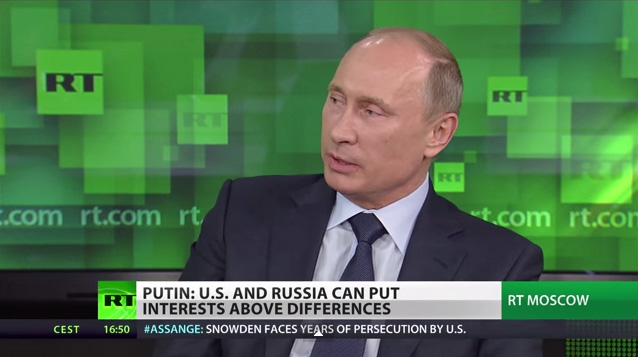 Vladimir Putin on RT, a state-owned news network that broadcasts in the US.
Vladimir Putin on RT, a state-owned news network that broadcasts in the US.
Russian Propaganda, Past and Future
News broke on September 11th, 2017 that the Department of Justice (DOJ) has compelled Russia’s state-owned network RT – formerly known as Russia Today – to register as a foreign agent. Not only will this event likely have repercussions for US international broadcasting efforts in Russia, it provides a valuable lesson in the often blurred line between Public Diplomacy and propaganda – a line the United States would do well to keep in mind.
The DOJ is acting under the Foreign Agents Registration Act (FARA), which states that every person acting as an “agent of a foreign principal” must register with the Attorney General. Enacted in 1938 in response to Nazi propaganda in the US, FARA does not go so far as to limit, censor, or otherwise prevent a foreign organization from distributing or broadcasting information. It simply forces foreign agents to publicly disclose their ties to foreign governments.
Although foreign media organizations are usually exempt from FARA, an August report by the Atlantic Council noted that RT would not be the first foreign outlet to register with FARA, and that although it’s not common, there is an established precedent for news outlets to register as agents. Those who are close to RT have pushed back against the DOJ’s action, claiming it impedes on freedom of speech. RT’s editor in chief, Margarita Simonyan, went so far as to state that “those who invented [freedom of speech] have buried it.”
The crackdown on Russian propaganda in the US will likely create implications for our own broadcasting networks abroad in Russia. The United States, through the Broadcasting Board of Governors (BBG), coordinates a number of international broadcasting entities with personnel or audiences in Russia, including Voice of America and Radio Free Europe/Radio Liberty (RFE/RL). Denied airtime by the Kremlin, VOA and RFE/RL broadcast digitally and via satellite, though their journalists still face discrimination and even physical intimidation from the Russian state. Following the introduction of a bipartisan bill in the House designed to “close the Russia Today loophole”, and counter “foreign propaganda dressed up as a legitimate news outlet,” Simonyan implied that US foreign networks might come under even more duress.

Voice of America anchors prepare to do a broadcast.
The DOJ’s investigation into RT is not without its critics, many of whom worry about the limitations the ruling imposes on freedom of expression. George Washington Law Professor Jonathan Turley argues that the investigation “crosses a long observed line for media.” Gabe Rottman, director of PEN America, an organization for freedom of expression, said that while it’s reasonable to be concerned about foreign interference in elections, but that “it’s difficult to distinguish between state propaganda and ‘bona-fide’ news, which is specifically carved out by FARA.”
American Security Project (ASP), in a 2013 fact sheet, defined propaganda as “Ideas, facts, or allegations spread deliberately to further one’s cause or to damage an opposing cause.” It is important to note that propaganda can be, and often is, completely truthful. In the case of RT, many of the stories they broadcast are distorted, based on quasi-facts, or biased towards Russia.
However, RT was never intended to be a bona fide news source, so its failure to meet the industry’s standards in that arena can’t be considered a failure. Dimitry Kiselyov, the manager of Rossiya Segodnya, the umbrella organization for several elements of Russian media, drove that point home in a speech to his employees, where he stated that “Objectivity is a myth […] If we speak about the editorial policy, of course, I would certainly want it to be associated with love for Russia.” The slant of RT’s coverage is undeniable, and that’s just how the Russian state would prefer it.
Pseudo-news networks aren’t the only outlets the Russian state uses to disseminate propaganda, nor are they the most successful. Forcing RT to register as a foreign agent won’t stop the Russian state from utilizing the type of information dissemination where it’s been most successful: social media.
On sites like Facebook, Twitter, and more recently LinkedIn, Russia has engaged in what can be classified as “gray propaganda”, which denotes that the source of the information is concealed or unidentifiable. One of the most well-known instances of this phenomenon took place in April 2017. Fox News ran, and later rescinded, a story that had been fabricated and amplified by Russian news sources; by the time the story went from a parody website, to Facebook, to Russian TV, to Fox, its origins were so distorted that it appeared, for a short time, to be credible.
This kind of gray propaganda is what the Russian state specializes in, and we can expect to see more of it in the coming years. RT’s compulsory registration as a foreign agent will likely decrease its credibility in its admittedly small audience of 8 million US viewers per week, but the true threat from Russia lies in areas other than its news outlets.






Very interesting article, well-written and informative.